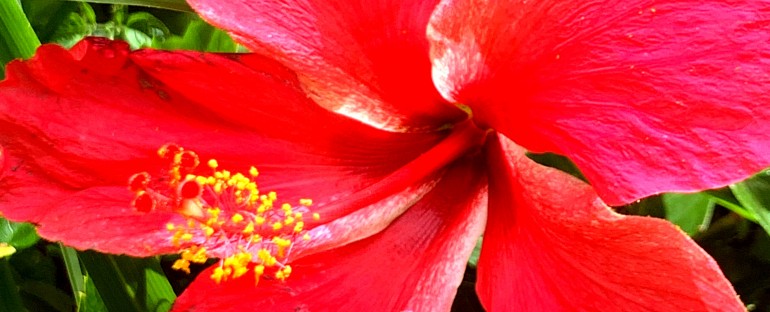“…you must embrace joy as a moral obligation.” ~Andre Gide
How do we avoid getting caught up in the pain and negativity in the world and in our own lives? I remember a quote I heard decades ago by Wayne Dyer that went something like this: You can never be unhappy enough to make someone else happy; you can never be sick enough to heal someone; you can never be poor enough to help someone become rich. This seems obvious enough, yet somehow we still tend to believe, maybe somewhere deep down, that the opposite is true. But really, there is no need to suffer in order to contribute to the uplifting of the world. Our suffering only adds to the suffering of the world. This doesn’t mean we should ignore our own or others’ pain. We can extend compassion and kindness, but we don’t need to become derailed from our innate inner peace and joy. In fact, when our cup is full we are better able to help others.
As I write this, I am sitting by the window at Kimobean coffee shop. Outside, tiny sparrows hop around under the patio tables pecking at crumbs, then soar against the clear blue sky to the tops of the palm trees and fly among the plumeria and hibiscus in the courtyard of the mostly deserted Mauna Lani shopping center. A little boy with a crew cut and a bandage on one knee plays with the door waiting for his mom to add milk and sugar to her coffee. I lift the white ceramic cup filled with hot green tea to take a sip and think of the years I worked at hospice–a zone of heartbreak and suffering.
How do you favor joy in the midst of grief? Many of my clients at hospice who had recently lost a loved one told me they felt guilty when they caught themselves laughing or enjoying some activity. They felt they were somehow dishonoring that person if they were not continually grieving. Naturally, even in the depths of their grief, there were times when their grief was forgotten. When these moments of relief came, they learned to allow and even embrace them without guilt. And these moments grew and deepened over time. Even the parents in the infant loss group I facilitated learned that being present for their grief carved out space for more joy.
I look up from my writing. A young man in a red baseball cap carrying his drink, stops to grab a napkin and heads outside followed by his young son. The little boy is clutching a well-worn, dingy gray stuffed bunny. I think of a pediatric nurse I met at a dinner party just before starting work at hospice.
Jackie (not her real name) worked in the pediatric oncology ward at the hospital. I wanted to know how she coped with such an intense job, facing so much trauma and suffering every day. What she shared with me was helpful as I began my journey working with children and adults facing death. She said she had learned that it is the job of children to play and play, and even in the oncology ward those children found a way to carry out this all-important job. Later when I worked with these children at the Teddy Bear Cancer Foundation, I was able to experience first hand what Jackie was talking about. The children were present in their lives. Whatever they were doing–coloring, playing with toys–they were fully engaged and brought the adults into the here and now with them.
We all carry that playful, innocent nature within us no matter how deeply buried it may have become. Happiness and freedom are intrinsic aspects of our nature. We can learn to tap into that part of ourselves even in the midst of suffering—maybe especially at those times.
The spiritual masters tell us that the present moment contains it all—joy and sorrow, pleasure and pain, inner peace and conflict. The more present we are, the more we can choose to favor the joy and peace contained in each moment. Of course, this doesn’t mean we will never feel anger, grief, or disappointment. It doesn’t mean we will continuously jump for joy. But it does mean that maybe we can experience a background sense of contentment and peace–even joy–no matter what is or is not happening.
We are fully alive when we expand our capacity for feeling the full range of human emotions and at the same time maintain our equanimity knowing we are not our emotions but the silent, ever-present witness. This is the purpose of the spiritual path.
I thought of the infant loss group as a container of compassion, understanding, and connection that held the suffering and promoted healing. Maybe we can be containers, in some way, for the suffering we see in the world. And that requires that we don’t get caught up and thrown off course, but maintain our center and remain connected to our own innate joy.
CONSIDER THIS: Can you accept that joy is a “moral obligation”?
Recent Posts
Recent Comments
- Terry Scott on CONTEMPLATING THE UNKNOWABLE
- Irene Kokatay on THE PATH OF SELF-KNOWLEDGE
- Terry on THE PATH OF SELF-KNOWLEDGE
- Irene Kokatay on LIVING IN INFINITY
- Terry Scott on LIVING IN INFINITY




